各种传统节日的中英文介绍
中国传统节日及传说中英文对照
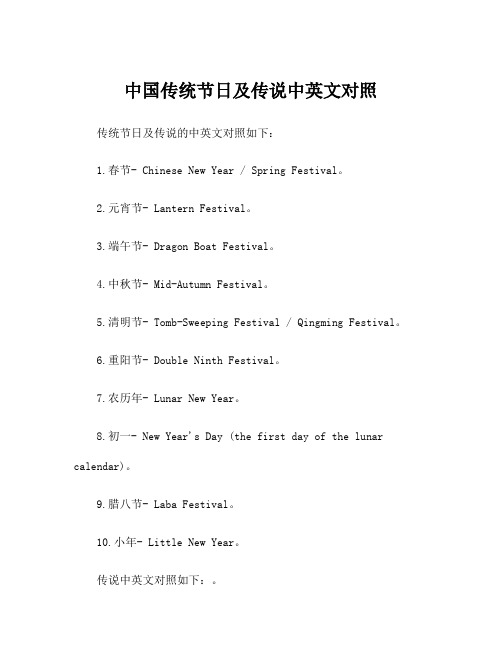
中国传统节日及传说中英文对照传统节日及传说的中英文对照如下:1.春节- Chinese New Year / Spring Festival。
2.元宵节- Lantern Festival。
3.端午节- Dragon Boat Festival。
4.中秋节- Mid-Autumn Festival。
5.清明节- Tomb-Sweeping Festival / Qingming Festival。
6.重阳节- Double Ninth Festival。
7.农历年- Lunar New Year。
8.初一- New Year's Day (the first day of the lunar calendar)。
9.腊八节- Laba Festival。
10.小年- Little New Year。
传说中英文对照如下:。
1.嫦娥奔月- Chang'e Flying to the Moon。
2.神话五岳- The Myth of the Five Sacred Mountains。
3.龙舟竞渡- The Legend of Dragon Boat Racing。
4.桃花源- The Peach Blossom Spring。
5.白蛇传- The Legend of White Snake。
6.八仙过海- The Eight Immortals Cross the Sea。
7.牛郎织女- The Cowherd and the Weaver Girl。
8.茶的传说- The Legend of Tea。
9.粽子的传说- The Legend of Zongzi。
10.红烧肉的传说- The Legend of Braised Pork Belly。
中国传统节日(中英文对照)
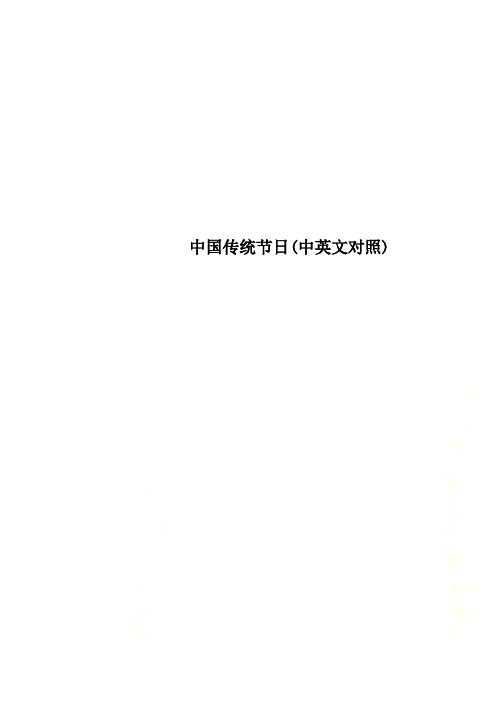
中国传统节日(中英文对照)中国传统节日(中英文对照简介)目录The Spring Festival(春节)Lantern Festival(元宵节)Qingming Festival(清明节)Dragon Boat Festival(端午节)Double Seventh Festival(七夕)Mid-Autumn Festival(中秋节)Double Ninth Festival(重阳节)Winter Solstice Festival(冬至)together to have dinner while watching TV programs.For Chinese at home and abroad, the Spring Festival is always the most important festival.农历的正(zheng)月初一,是中国的农历新年。
在中国的传统节日中,这是一个最重要、最热闹的节日。
因为过农历新年的时候,正是冬末春初,所以人们也把这个节日叫“春节”。
中国人过春节有很多传统习俗。
从腊月二十三起,人们就开始准备过年了。
在这段时间里,家家户户要大扫除,买年货,贴窗花,挂年画,写春联,蒸年糕,做好各种食品,准备辞旧迎新。
春节的前夜叫“除夕”。
除夕之夜,是家人团聚的时候。
一家人围坐在一起,吃一顿丰盛的年夜饭,说说笑笑,直到天亮,这叫守岁。
除夕零点的钟声一响,人们还要吃饺子。
古时候叫零点为“子时”,除夕的子时正是新旧年交替的时候,人们在这时吃饺子,是取“更岁交子”的意思。
这也是“饺子”名称的由来。
过了除夕就是大年初一。
从初一开始,人们要走亲戚、看朋友,互相拜年。
拜年,是春节的重要习俗。
拜年时,大家都要说一些祝愿幸福、健康的吉祥话。
放爆竹是春节期间孩子们最喜欢的活动。
传说燃放爆竹可以驱妖除魔,所以每年从除夕之夜起,到处就响起了接连不断的爆竹声。
阵阵烟花,声声爆竹,给节日增添了喜庆的气氛。
各种传统节日的中英文介绍
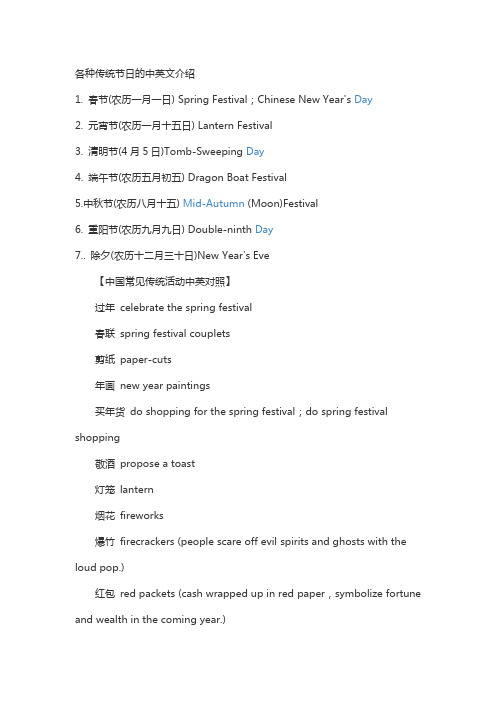
各种传统节日的中英文介绍1. 春节(农历一月一日) Spring Festival;Chinese New Year's Day2. 元宵节(农历一月十五日) Lantern Festival3. 清明节(4月5日)Tomb-Sweeping Day4. 端午节(农历五月初五) Dragon Boat Festival5.中秋节(农历八月十五) Mid-Autumn (Moon)Festival6. 重阳节(农历九月九日) Double-ninth Day7.. 除夕(农历十二月三十日)New Year's Eve【中国常见传统活动中英对照】过年celebrate the spring festival春联spring festival couplets剪纸paper-cuts年画new year paintings买年货do shopping for the spring festival;do spring festival shopping敬酒propose a toast灯笼lantern烟花fireworks爆竹firecrackers (people scare off evil spirits and ghosts with the loud pop.)红包red packets (cash wrapped up in red paper,symbolize fortune and wealth in the coming year.)舞狮lion dance (the lion is believed to be able to dispel evil and bring good luck.)舞龙dragon dance (to expect good weather and good harvests)戏曲traditional opera杂耍variety show灯谜riddles written on lanterns灯会exhibit of lanterns守岁staying-up拜年pay new year's call;give new year's greetings;pay new year's visit禁忌taboo去晦气get rid of the ill- fortune祭祖宗offer sacrifices to one's ancestors压岁钱gift money;money given to children as a lunar new year gift culture note;inthe old days,new year's money was given in the form of one hundred copper coins strung together on a red string and symbolized the hope that one would live to be a hundred years old. today, money is placed inside red envelopes in denominations considered auspicious and given to represent luck and wealth 辞旧岁bid farewell to the old year扫房spring cleaning; generalhouse-cleaning年糕nian-gao; rise cake; new year cake团圆饭family reunion dinner年夜饭the dinner on new year's eve 饺子jiao-zi/dumpling粽子rice dumpling。
中国传统节日英语知识
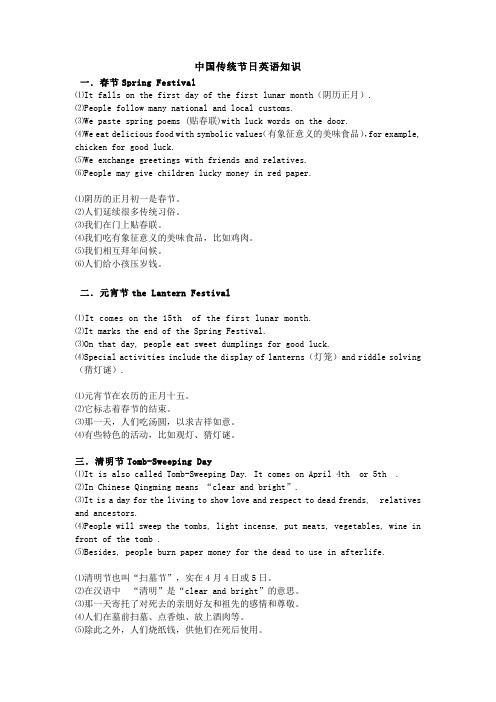
中国传统节日英语知识一.春节Spring Festival⑴It falls on the first day of the first lunar month(阴历正月).⑵People follow many national and local customs.⑶We paste spring poems (贴春联)with luck words on the door.⑷We eat delicious food with symbolic values(有象征意义的美味食品),for example, chicken for good luck.⑸We exchange greetings with friends and relatives.⑹People may give children lucky money in red paper.⑴阴历的正月初一是春节。
⑵人们延续很多传统习俗。
⑶我们在门上贴春联。
⑷我们吃有象征意义的美味食品,比如鸡肉。
⑸我们相互拜年问候。
⑹人们给小孩压岁钱。
二.元宵节the Lantern Festival⑴It comes on the 15th of the first lunar month.⑵It marks the end of the Spring Festival.⑶On that day, people eat sweet dumplings for good luck.⑷Special activities include the display of lanterns(灯笼)and riddle solving (猜灯谜).⑴元宵节在农历的正月十五。
⑵它标志着春节的结束。
⑶那一天,人们吃汤圆,以求吉祥如意。
⑷有些特色的活动,比如观灯、猜灯谜。
三.清明节Tomb-Sweeping Day⑴It is also called Tomb-Sweeping Day. It comes on April 4th or 5th .⑵In Chinese Qingming means “clear and bright”.⑶It is a day for the living to show love and respect to dead frends, relatives and ancestors.⑷People will sweep the tombs, light incense, put meats, vegetables, wine in front of the tomb .⑸Besides, people burn paper money for the dead to use in afterlife.⑴清明节也叫“扫墓节”,实在4月4日或5日。
中国传统节日(中英文对照)
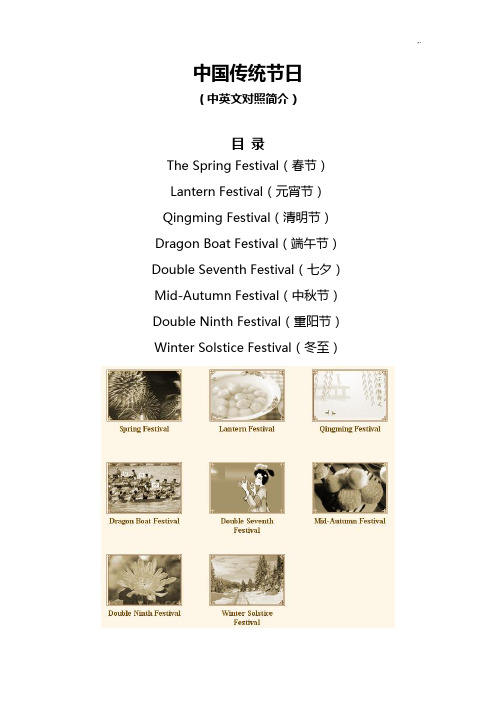
中国传统节日(中英文对照简介)目录The Spring Festival(春节)Lantern Festival(元宵节)Qingming Festival(清明节)Dragon Boat Festival(端午节)Double Seventh Festival(七夕)Mid-Autumn Festival(中秋节)Double Ninth Festival(重阳节)Winter Solstice Festival(冬至)The Spring Festival(春节)The first day of the first lunar month is the New Year in the Chinese lunar calendar. Among the traditional Chinese festivals, this is the most important and the most bustling. Since it occurs at the end of winter and the beginning of spring, people also call it the Spring Festival.Chinese have many traditional customs relating to the Spring Festival. Since the 23rd day of the 12th lunar montha, people start to prepare for the event. Every family will undertake thorough cleaning, do their Spring Festival shopping, create paper-cuts for window decoration, put up New Year picturesb, write Spring Festival coupletsc, make New Year cakesd, and also prepare all kinds of food to bid farewell to the old and usher in the new.New Year's Eve is the time for a happy reunion of all family members, when they sit around the table to have a sumptuous New Year's Eve dinner, talking and laughing, until daybreak, which is called "staying up to see the year out". When the bell tolls midnight on New Year's Eve, people eat dumplings. In ancient times, midnight was called zishi (a period of the day from 11 p.m. to 1 a.m.). Dumplings (jiaozi) are eaten because it sounds the same as "change of the year and the day" in Chinese.From the first day of the lunar year, people pay New Year calls on relatives and friends, which is an important custom for the Spring Festival.Setting off firecrackers is the favorite activity of children in the Spring Festival. According to legend, this could drive off evil spirits. The continuous sound of firecrackers can be heard everywhere, adding to the atmosphere of rejoicing and festivity.Many places hold temple fairs. The wonderful dragon lantern dance and the lion dance performances, along with various handicraft articles and local snacks attract thousands of people.With the development of the times, some changes have taken place inthe customs of spending the Spring Festival. For example, to prevent environmental pollution, many cities have banned firecrackers. But this does not have an impact on the happy atmosphere of the festival. On New Year's Eve, family members get together to have dinner while watching TV programs.For Chinese at home and abroad, the Spring Festival is always the most important festival.农历的正(zheng)月初一,是中国的农历新年。
中西方传统节日的英语总结

中西方传统节日的英语总结1.元旦(1月1日) New Year's Day2.春节(农历一月一日) Spring Festival;Chinese New Year's Day3.元宵节(农历一月十五日) Lantern Festival4.妇女节(3月8日) Women's Day5.清明节(4月5日) Tomb-Sweeping Day6.劳动节(5月1日) International Labor Day7.端午节(农历五月初五) Dragon Boat Festival8.儿童节(6月1日) International Children's Day9.七夕节(农历七月初七)Double Seventh Festival;Chinese Valentine's Day10.中秋节(农历八月十五) Mid-Autumn (Moon)Festival11.重阳节(农历九月九日) Double-ninth Day12.教师节(9月10日) Teachers' Day13.国庆节(10月1日) National Day14.除夕(农历十二月三十日)New Year's Eve1.新年(1月1日) New Year's Day2.情人节(2月14日) Valentine's Day3.愚人节(4月4日) April Fool′s Day4.复活节(春分月圆后的第一个星期日3月21至4月25之间) Easter Day5.母亲节(5月的第二个星期日) Mother's Day6.父亲节(6月的第三个星期日) Father's Day7.万圣节(11月1日) Halloween Day8.感恩节(11月的第四个星期四) Thanksgiving Day9.平安夜(12月24日) Christmas Eve10.圣诞节(12月25日) Christmas Day。
中国传统节日中英文对照
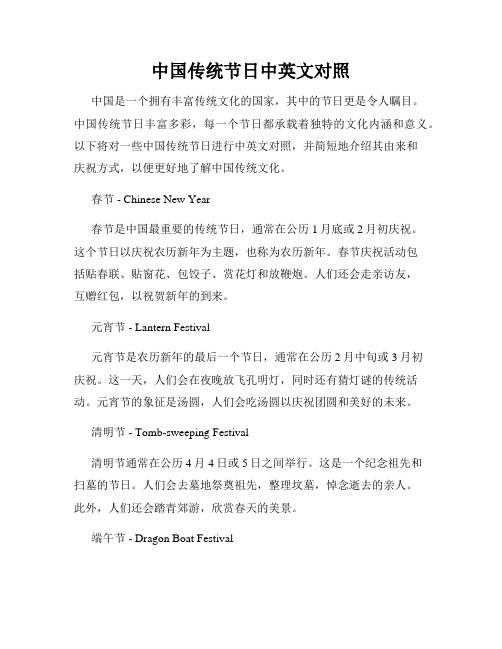
中国传统节日中英文对照中国是一个拥有丰富传统文化的国家,其中的节日更是令人瞩目。
中国传统节日丰富多彩,每一个节日都承载着独特的文化内涵和意义。
以下将对一些中国传统节日进行中英文对照,并简短地介绍其由来和庆祝方式,以便更好地了解中国传统文化。
春节 - Chinese New Year春节是中国最重要的传统节日,通常在公历1月底或2月初庆祝。
这个节日以庆祝农历新年为主题,也称为农历新年。
春节庆祝活动包括贴春联、贴窗花、包饺子、赏花灯和放鞭炮。
人们还会走亲访友,互赠红包,以祝贺新年的到来。
元宵节 - Lantern Festival元宵节是农历新年的最后一个节日,通常在公历2月中旬或3月初庆祝。
这一天,人们会在夜晚放飞孔明灯,同时还有猜灯谜的传统活动。
元宵节的象征是汤圆,人们会吃汤圆以庆祝团圆和美好的未来。
清明节 - Tomb-sweeping Festival清明节通常在公历4月4日或5日之间举行。
这是一个纪念祖先和扫墓的节日。
人们会去墓地祭奠祖先,整理坟墓,悼念逝去的亲人。
此外,人们还会踏青郊游,欣赏春天的美景。
端午节 - Dragon Boat Festival端午节是一个具有悠久历史的节日,通常在公历6月初庆祝。
这个节日源于纪念古代爱国诗人屈原,也是一项庆祝夏天到来的活动。
人们会参加龙舟赛、包粽子和挂艾草。
象征食物是粽子,人们吃粽子以保护自己免受邪恶和疾病的侵袭。
中秋节 - Mid-Autumn Festival中秋节是农历八月十五,通常在公历9月底或10月初庆祝。
这个节日庆祝秋天的丰收和团圆。
人们会赏月、品尝月饼以及举办家庭聚会。
月饼是中秋节的特色食物,馅料的种类多样,寓意着团圆和祝福。
重阳节 - Double Ninth Festival重阳节通常在公历9月初或10月底庆祝,也被称为老人节。
此节日的由来与古代传说有关,人们会爬山、采菊、追溯阳光,并祝福年长的亲人和朋友。
重阳节也是缅怀祖先和尊重老年人的时间。
中国传统节日(中英文对照)

中国传统节日(中英文对照简介)目录The Spring Festival(春节)Lantern Festival(元宵节)Qingming Festival(清明节)Dragon Boat Festival(端午节)Double Seventh Festival(七夕)Mid-Autumn Festival(中秋节)Double Ninth Festival(重阳节)Winter Solstice Festival(冬至)The Spring Festival(春节)The first day of the first lunar month is the New Year in the Chinese lunar calendar. Among the traditional Chinese festivals, this is the most important and the most bustling. Since it occurs at the end of winter and the beginning of spring, people also call it the Spring Festival.Chinese have many traditional customs relating to the Spring Festival. Since the 23rd day of the 12th lunar montha, people start to prepare for the event. Every family will undertake thorough cleaning, do their Spring Festival shopping, create paper-cuts for window decoration, put up New Year picturesb, write Spring Festival coupletsc, make New Year cakesd, and also prepare all kinds of food to bid farewell to the old and usher in the new.New Year's Eve is the time for a happy reunion of all family members, when they sit around the table to have a sumptuous New Year's Eve dinner, talking and laughing, until daybreak, which is called "staying up to see the year out". When the bell tolls midnight on New Year's Eve, people eat dumplings. In ancient times, midnight was called zishi (a period of the day from 11 p.m. to 1 a.m.). Dumplings (jiaozi) are eaten because it sounds the same as "change of the year and the day" in Chinese.From the first day of the lunar year, people pay New Year calls on relatives and friends, which is an important custom for the Spring Festival.Setting off firecrackers is the favorite activity of children in the Spring Festival. According to legend, this could drive off evil spirits. The continuous sound of firecrackers can be heard everywhere, adding to the atmosphere of rejoicing and festivity.Many places hold temple fairs. The wonderful dragon lantern dance and the lion dance performances, along with various handicraft articles and local snacks attract thousands of people.With the development of the times, some changes have taken place in the customs of spending the Spring Festival. For example, to prevent environmental pollution, many cities have banned firecrackers. But this does not have an impact on the happy atmosphere of the festival. On New Year's Eve, family members get together to have dinner while watching TV programs.For Chinese at home and abroad, the Spring Festival is always the most important festival.农历的正(zheng)月初一,是中国的农历新年。
- 1、下载文档前请自行甄别文档内容的完整性,平台不提供额外的编辑、内容补充、找答案等附加服务。
- 2、"仅部分预览"的文档,不可在线预览部分如存在完整性等问题,可反馈申请退款(可完整预览的文档不适用该条件!)。
- 3、如文档侵犯您的权益,请联系客服反馈,我们会尽快为您处理(人工客服工作时间:9:00-18:30)。
各种传统节日的中英文介绍
1. 春节(农历一月一日) Spring Festival;Chinese New Year's Day
2. 元宵节(农历一月十五日) Lantern Festival
3. 清明节(4月5日)Tomb-Sweeping Day
4. 端午节(农历五月初五) Dragon Boat Festival
5.中秋节(农历八月十五) Mid-Autumn (Moon)Festival
6. 重阳节(农历九月九日) Double-ninth Day
7.. 除夕(农历十二月三十日)New Year's Eve
【中国常见传统活动中英对照】
过年celebrate the spring festival
春联spring festival couplets
剪纸paper-cuts
年画new year paintings
买年货do shopping for the spring festival;do spring festival shopping
敬酒propose a toast
灯笼lantern
烟花fireworks
爆竹firecrackers (people scare off evil spirits and ghosts with the loud pop.)
红包red packets (cash wrapped up in red paper,symbolize fortune and wealth in the coming year.)
舞狮lion dance (the lion is believed to be able to dispel evil and bring good luck.)
舞龙dragon dance (to expect good weather and good harvests)
戏曲traditional opera
杂耍variety show
灯谜riddles written on lanterns
灯会exhibit of lanterns
守岁staying-up
拜年pay new year's call;give new year's greetings;pay new year's visit
禁忌taboo
去晦气get rid of the ill- fortune
祭祖宗offer sacrifices to one's ancestors
压岁钱gift money;money given to children as a lunar new year gift culture note;inthe old days,new year's money was given in the form of one hundred copper coins strung together on a red string and symbolized the hope that one would live to be a hundred years old. today, money is placed inside red envelopes in denominations considered auspicious and given to represent luck and wealth 辞旧岁bid farewell to the old year
扫房spring cleaning; generalhouse-cleaning
年糕nian-gao; rise cake; new year cake
团圆饭family reunion dinner
年夜饭the dinner on new year's eve 饺子jiao-zi/dumpling
粽子rice dumpling。
